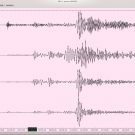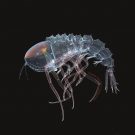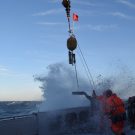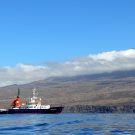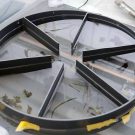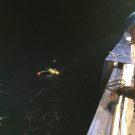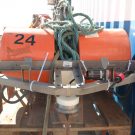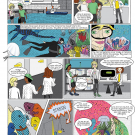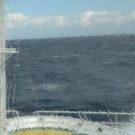During our last days here in our working area we are shifting it into gear, because it is harvesting time! Finally we will have a look at our data coming back from the sea floor – we all have been waiting for this very moment since weeks now (and some of us since a few […]
POS520: Insects of the deep sea / Hyperiide Amphipoden – die Insekten der Tiefsee
(Deutsche Version unten) Between the 14 Feb and 1 May expedition POS520 with RV Poseidon and the submersible JAGO takes place off the coast of the cape verde island Santo Antão. The chief scientist, the JAGO team and participants of the cruise write here as guest writers. Today: Karen Osborn, Curator of Marine Invertebrates at […]
On the edge
In our last blog entries we have already reported on our gear and how difficult recovery can be at times. Today, we would like to share some of the daily working life of the scientists here on board with you. Marine geophysical surveys commonly require a large number of helping hands (and brains, of course). […]
Wie viel Mikroplastik ist an unseren Stränden?
Das Thema Mikroplastik ist derzeit in aller Munde. Fast jeder hat schon von diesen Teilchen gehört, die man kaum sehen kann und die doch anscheinend überall sind: In unserer Zahncreme, in unserem Duschgel, möglicherweise auch in unserer Nahrung, vor allem aber in unserer Umwelt. Die Sorge um die Folgen dieser Verschmutzung umtreibt viele Menschen, und […]
POS520 Cape Verde Cruise / POS520 Fahrt um die Kapverden
(Deutsche Version unten) Between the 14 Feb and 1 March 2018 expedition POS520 with RV POSEIDON and the submersible JAGO takes place off the coast of the cape verde island Santo Antão. The chief scientist, the JAGO team and participants of the cruise write here as guest writers. Today Henk-Jan Hoving, GEOMAR, Deep Sea Biologist, […]
GAME 2018: Grazing in a warmer ocean revisited – will marine invertebrates change their food preferences?
In the last GAME project, the student teams found experimental evidence for the assumption that consumption rates of herbivorous invertebrates will increase when the ocean gets warmer. However, their experiment was (like all experiments) somehow limited, since they offered their test animals a mono-diet that did not give them the chance to change their food […]
To fish in muddy waters…
Doing science at sea has its very own rules – just like the German soccer cup or DFB-Pokal, for which the saying goes: The cup makes its own rules. The teams dedicate many months to a thorough preparation, all options are evaluated, everything is double-checked, every tactical variation is considered and at the end everything […]
Ocean bottom What??
If you want to get an image of the Alps, you need seismometers surrounding the area. But how do you get the seismometers to work at the bottom of the sea? And how do you get them back? To explain this, we invite you to a virtual journey on board of the research vessel Maria […]
Science Comic – English version
Finally, here is the english version of the science comic developed in cooperation with the scientist Dr. Lucia Pita and the science illustrator Dr. Susanne Landis, Scienstration. If the font is too small to read on the screen: simply zoom in on the image with the key combination “ctrl” and “+”. Keep your eyes peeled […]
EN ROUTE !
With a few hours delay we left the port of Las Palmas on Gran Canaria to sail to the Ligurian Sea. The start of MSM 71 indeed proved stormy: The Atlantic waters greeted us with winds of 7 Bft and gales of up to 10 Bft with waves of 6 m height. Nonetheless, everybody on […]
